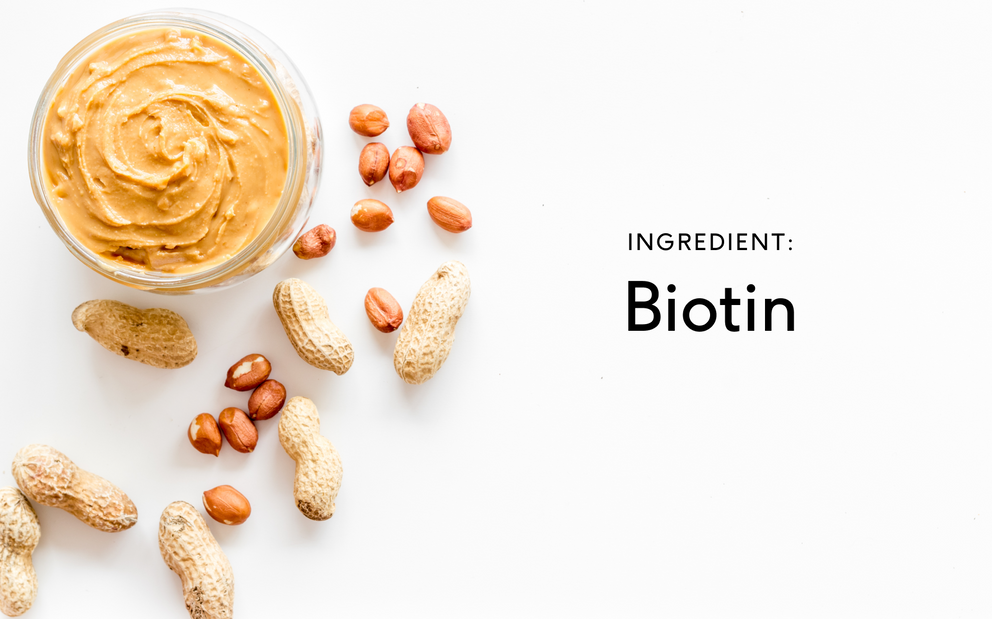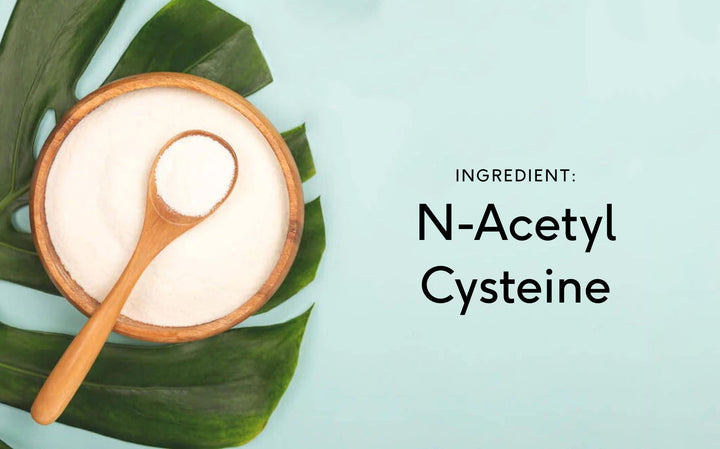Learn About Biotin (Vitamin B7) in 5 Minutes
Table of contents

What is biotin?
Biotin, also known as vitamin B7, is a critical component of the B vitamin complex, which is involved in energy production in the body. Biotin prevents certain types of birth defects, and it helps keep your hair, skin, and nails looking healthy.
- Improves your skin and hair health to keep you looking good
- Reduces triglycerides and cholesterol to improve your heart health
- Improves the symptoms of multiple sclerosis and defends your nervous system
- Prevents birth defects by keeping pregnant women healthy
- May reduce blood sugar in diabetics
Why we love biotin
Biotin, also known as vitamin B7, is a critical component of the B vitamin complex. In combination with the other B vitamins, biotin helps your body process energy, and this vitamin also prevents potentially fatal birth defects in babies. Plus, biotin also appears to reduce blood sugar in people who have type 2 diabetes, and this vitamin may even reduce the symptoms of multiple sclerosis, which causes dangerous and painful effects.
Even if you don’t have any serious conditions, you can still benefit from biotin’s ability to improve the looks and health of your hair, skin, and nails, and this nutrient also removes harmful components from your blood that can cause coronary artery disease and atherosclerosis. With these benefits in mind, it was a no-brainer to include this powerful B vitamin in Feel
Unbelievable benefits of biotin
Here are just a few of the scientifically-proven benefits of biotin:
Reproductive Benefits
When women are pregnant and breastfeeding, they need more nutrients. It’s much easier to become deficient in vitamins and minerals during these life stages, but biotin deficiency during pregnancy can have disastrous consequences.
When women don’t consume enough biotin during pregnancy, their babies are more likely to have birth defects. Specifically, biotin deficiency during pregnancy can cause neural tube defects, which can be fatal for infants. Women who get enough biotin during pregnancy are less likely to have miscarriages or give birth prematurely.
Feel Pregnancy provides a complete range of B vitamins with health benefits including support for a healthy functioning nervous system, reduction of tiredness and fatigue, and supported energy release from food.
Hair and Skin Benefits
If you have brittle nails, you should incorporate more biotin into your diet. Studies show that biotin supplementation makes your nails healthier, and this powerful B vitamin also reduces nail splitting.
When you’re deficient in biotin, your hair quality suffers. While you might not experience any increases in hair quality when you supplement with biotin without being deficient in this B vitamin, biotin supplementation in deficient individuals significantly increases hair follicle strength.
Biotin deficiency can cause a condition called seborrheic dermatitis, which makes your skin dry and scaly. Making sure that you get enough biotin can prevent this condition, and when you consume plenty of this this B vitamin when you’re pregnant, your baby has a reduced chance of developing cradle cap.
Diabetes Benefits
People who have diabetes have lower levels of biotin than healthy individuals. When medical researchers combined biotin and chromium and administered this mixture to people with type 2 diabetes, however, they noted a decrease in blood sugar levels.
Neurological Benefits
Researchers believe that biotin is critically involved in the synthesis of myelin, which is a substance that coats and protects the components of your nervous system. Multiple sclerosis is a condition that destroys the myelin sheaths around your neurons, which leads to nervous system breakdown and severe pain. One study found that biotin administration improved symptoms in 90 percent of patients with multiple sclerosis.
Along with other B vitamins, biotin helps keep your nervous system in working order by assisting with neurotransmitter activity. Feel Focus contains 200μg of Biotin, perfect for protecting your brain, improving memory and defending against cognitive issues.
Cardiovascular Benefits
Biotin appears to reduce triglyceride levels in the body, which may prevent various forms of heart disease. This vitamin also reduces LDL-C cholesterol levels, which reduces your risk of atherosclerosis.
Is biotin water-soluble or fat-soluble?
All the nutrients in the B vitamin complex are water-soluble, and vitamin B7 is no exception. Since this nutrient is water-soluble, your body excretes it quickly, which means it’s necessary to constantly replenish your biotin levels.
Where can biotin be found naturally?
Biotin is stored in the liver of most animals so eating animal livers is one of the best ways to consume biotin. However, vegetarians can also find this nutrient in egg yolks and other types of dairy, and for vegans, biotin is available in many nuts and seeds.
5 foods/drinks containing biotin
1. Liver 138% DV per 100g
2. Peanuts 94% DV per 100g
3. Yolks 66% DV per 100g
4. Almonds 53% DV per 100g
5. Sweet potato 26% DV per 100g
What is the recommended daily intake for biotin?
The Office of Dietary Supplements recommends that both male and female adults consume approximately 30mcg of biotin per day. Adolescents should consume slightly less biotin.
What to consume to get a full daily dose of biotin?
Liver - approximately 70g
Yolks - approximately 150g
Peanuts - approximately 63g
Almonds - approximately 112g
Sweet potato - approximately 380g
Can you absorb enough of biotin from food?
Compared to other essential nutrients, it is remarkably hard to get your daily vitamin B7 intake with food. Avoiding vitamin B7 deficiency is especially hard for vegetarians and vegans; there aren’t many non-animal sources of biotin, and if you happen to have a sensitivity to nuts, consuming enough vitamin B7 every day becomes even harder.
Why is biotin necessary for your body?
The various parts of the vitamin B complex work together to process the nutrients you consume into glucose, which your body uses to transfer energy throughout your body via your bloodstream. If you don’t have enough vitamin B7, your ability to absorb other nutrients is diminished. Vitamin B7 also appears to prevent several common diseases.
Functions of biotin
Gestation aid: Biotin helps fetal development and prevents birth defects.
Hair, skin, and nails regenerator: Vitamin B7 improves hair follicle strength, prevents brittle nails, and prevents dry and scaly skin.
Blood sugar modulator: Vitamin B7 appears to help stabilise blood sugar levels in diabetics
Myelin synthesiser: Myelin coats the ends of your neurons, your body can’t produce this substance without biotin.
Symptoms of biotin deficiency
Red, Scaly Skin
Since vitamin B7 is critical to the proper maintenance of your skin cells, biotin deficiency can result in red, scaly skin on your face and on the rest of your body.
Loss of Hair Quality and Hair Loss
When you are deficient in biotin, your hair loses its strength, and it becomes more prone to falling out. Severe vitamin B7 deficiency can trigger or exacerbate hair loss in both men and women.
Fatigue and Insomnia
Deficiency in vitamin B7 alters the was that your body processes energy. This interruption of normative biological processes can result in fatigue during the day and an inability to sleep at night.
How long do you need to take biotin for to start experiencing its benefits?
Depending on your health goals, you may observe benefits from supplementing from biotin within 30-90 days.
Consistency is key and our research recommends taking your Feel supplements for at least 3 months to allow your body to adjust and provide the desired benefits.
How long does it take for your body to digest/absorb biotin?
As a water-soluble nutrient, vitamin B7 is absorbed rapidly. When you are deficient in this substance, you absorb it more slowly, but in healthy adults, approximately 90% of ingested biotin is absorbed within 24 hours.
How long does biotin stay in your body after you take it?
Your body excretes vitamin B7 rapidly, which necessitates regular ingestion of this compound. Unlike fat-soluble nutrients, biotin does not build up or store in your body.
Is biotin an antioxidant?
No, vitamin B7 is not an antioxidant. While antioxidants fight free radicals and help reduce inflammation, biotin does not perform these functions.
Can you overdose on biotin? What are the effects?
Since biotin is a water-based nutrient, it is exceedingly hard to overdose on this vitamin. Overdosing on vitamin B7 is further made unlikely by the relatively low concentrations of this substance present in food. Common symptoms of biotin overdose include allergic reactions in your skin such as flushing, itchiness, and rashes. Ensure that you do not exceed your RDA of biotin to avoid overdose symptoms.
Does biotin dissolve, flush out, or build up in the body?
Biotin does not build up in your body. Instead, it is rapidly flushed out of your system.
Can you take biotin during a diet?
Vitamin B7 itself does not interfere with diets, but many of the sources of this nutrient may violate your dietary restrictions. Therefore, it is best to consume this nutrient in an oral supplement form.
Are there synthetic forms of biotin?
Yes, out of the eight types of biotin, seven are synthetic. Only D-biotin (or biotin D) is natural.
Why might synthetic forms of biotin be better?
Scientific research has not identified any advantages of consuming synthetic biotin. Since genuine D-biotin is hard to extract, however, there may be economic advantages to producing and marketing synthetic vitamin B7.
Absorption rate of synthetic biotin
No scientific data are available on absorption rate differences between synthetic and natural biotin. However, some sources contend that biotin isolate, which is present in most supplements, may be less effective and offer inferior absorption.
Why might natural forms of biotin be better?
There is evidence suggesting that the effectiveness of vitamin B7 is increased when it is ingested with other B vitamins. It’s also possible that natural biotin is more bioavailable than synthetic vitamin B7, which means that more of it is absorbed prior to excretion.
How to take biotin
Vitamin B7 is taken orally; it is not absorbed by the hair, skin, or other organs. Due to the scarcity of biotin sources, oral supplementation may be the best way to ensure you consume enough vitamin B7 on a daily basis.
Biotin trends in medicine
Recently, scientists have been experimenting with vitamin B7 as a multiple sclerosis drug. According to preliminary research, high doses of biotin may be able to reduce the symptoms of MS, but less than 15% of the test subjects showed favourable results. Even so, new applications of this vitamin are appearing every day.
Why everyone should be taking WeAreFeel supplements
Biotin is one of the hardest supplements to source from food, and if you are a vegetarian or a vegan, you need to be taking Feel to avoid biotin deficiency. Becoming deficient in this essential nutrient is especially dangerous for pregnant women since it can result in birth defects. Feel includes exactly how much biotin you need without providing any opportunity for overdosing; to make sure you have enough biotin to stay healthy, take Feel every day!
Here’s the Proof
- Dietary biotin deficiency affects reproductive function and prenatal development in hamsters.
- Treatment of brittle fingernails and onychoschizia with biotin: scanning electron microscopy.
- Biotin and biotinidase deficiency
- Dermatologic signs of biotin deficiency leading to the diagnosis of multiple carboxylase deficiency.
- Therapeutic Evaluation of the Effect of Biotin on Hyperglycemia in Patients with Non-Insulin Dependent Diabetes Mellitus.
- Chromium picolinate and biotin combination reduces atherogenic index of plasma in patients with type 2 diabetes mellitus: a placebo-controlled, double-blinded, randomised clinical trial.
- Targeting demyelination and virtual hypoxia with high-dose biotin as a treatment for progressive multiple sclerosis.
- High doses of biotin in chronic progressive multiple sclerosis: a pilot study.
- Biotin supplementation reduces plasma triacylglycerol and VLDL in type 2 diabetic patients and in nondiabetic subjects with hypertriglyceridemia.




















































 Back
Back





